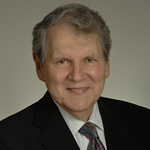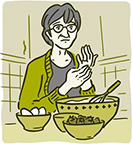SPOTLIGHT
Letter from Dr. Stephen I. Katz: Communicating Research Progress and Impact
Dear Colleagues,
Last month, the National Institutes of Health (NIH) shared new guidance regarding the use of preprints, which are manuscripts before they have been peer-reviewed, edited or published. The notice clarified reporting instructions for preprints—and other interim research products—to allow investigators to cite and claim them as products of NIH funding. We encourage investigators to use preprints to enhance the rigor and transparency of their work, speed information dissemination and better communicate the impact of NIH-funded research.
Image: Stephen I. Katz, M.D., Ph.D.
NEWS
NIH Request for Applications for Activities To Promote Research Collaborations on Immune-Related Adverse Events Associated With Cancer Immunotherapy
The NIH released a funding opportunity announcement for current NIAMS grantees titled, “Activities to Promote Research Collaborations on Immune-Related Adverse Events (APRC-irAEs) Associated with Cancer Immunotherapy” as a part of the Cancer Moonshot Program. To encourage the formation of multidisciplinary teams with expertise in mechanisms of cancer immunology/immunotherapy as well as immune tolerance and/or autoimmunity, teams that include a current National Cancer Institute (NCI) grantee and a current NIAMS grantee are encouraged to propose pilot projects. Applications are due on June 15, 2017.
NIH Request for Revision Applications for Regenerative Medicine Innovation Projects
The 21st Century Cures Act included a provision to support a Regenerative Medicine Innovation Project. With fiscal year 2017 allocations, the NIH and the U.S. Food and Drug Administration have issued funding opportunity announcements (FOAs) for competitive revisions to support ongoing clinical research studies in regenerative medicine. The NIAMS is participating in many of the FOAs. Applicants are to propose solutions to widely recognized issues in the development of safe and effective regenerative medicine therapies. Emphasis will be given to projects that address critical issues in product development relevant for regulatory submissions.
Insight Into Lupus-Associated CD11b Mutations

Mariana J. Kaplan, M.D., chief of the Systemic Autoimmunity Branch in the NIAMS Intramural Program, discusses research on CD11b mutations as they relate to lupus and the possibilities for CD11b activation as a therapeutic strategy for systemic lupus erythematosus.
Repairing Torn Rotator Cuffs
Torn rotator cuff injuries can cause pain and impair mobility in the shoulder, and when that injury is severe, surgery may be needed. To help improve the field of surgical repair of tendons—such as the rotator cuff—NIAMS-supported researchers have developed a method that uses stem cells seeded in a polymer scaffold. Their research in rats showed that the seeded scaffold method was superior to other types of repair and could lead to improved methods of repairing rotator cuff tears in people.
Photo: The seeded scaffold was placed on a torn rat tendon by wrapping it with a suture.
Photo credit: Laurencin lab, PLoS One.
Painful Joints? Early Treatment for Rheumatoid Arthritis Is Key
Did you know that there are over 100 types of arthritis? Rheumatoid arthritis (RA) is one of the most common. Find out what leading researchers in the field—including NIAMS’ Chief of Clinical Trials and Outcomes Branch Michael Ward, M.D.— are saying about RA treatment today, and learn about some of their goals for current and future research.
RESOURCES
Spotlight on Scientific Imagery: Sensory Neurons and Dendritic Cells in Mouse Skin

Scientists are increasingly uncovering evidence of cross-talk between the nervous system and the immune system in many diseases, including psoriasis. Neurons (red) in mouse skin communicate with dermal dendritic cells (green), a type of immune cell, to drive inflammation in psoriasis. This role of the nervous system presents a new pathway for researchers to develop treatments for psoriasis and possibly other inflammatory skin diseases.
Photo credit: Ulrich von Andrian, M.D., Ph.D., Harvard Medical School.
EVENTS
June NIAMS Advisory Council Meeting
The NIAMS Advisory Council Meeting will be held June 21, 2017, in Building 31, 6th Floor, C Wing, Conference Room 6, NIH Campus, Bethesda, MD. A meeting agenda will be posted as soon as it is available. This Council meeting will be available for live viewing via the NIH videocasting service as well.

12th Annual NIH Pain Consortium Symposium on Multidisciplinary Strategies for Pain
May 31–June 1, 2017
NIH Campus, Bethesda, Maryland
Cost: Free
Details and registration information available here.
Chronic Inflammation Biomarkers in Disease Development and Prevention
May 31–June 1, 2017
Rockville, Maryland
Cost: Free
Details and registration information available here.
NIH Wednesday Afternoon Lecture Series
The NIH’s Wednesday Afternoon Lecture Series offers weekly lectures every Wednesday at 3:00 p.m. in Masur Auditorium, Building 10, NIH Campus. Renowned scientists from around the globe present research on a variety of topics. The lectures are Continuing Medical Education-certified, open to the public and available live via webcast.
Upcoming Lecture:
June 21, 2017
Dinshaw J. Patel, Ph.D., Memorial Sloan-Kettering Cancer Center
“Structural Biology of Gene, Epigenetic and Immune Regulation”
NIH Science Lectures and Events Available via Internet
The NIH hosts a number of science seminars and events that are available online through real-time streaming video (videocast). The NIH calendar notes these videocast events with a video icon ![]() .
.
Funding Announcements
If you would like information about funding opportunities, please view the NIH Guide for Grants and Contracts, the primary source for information about NIH funding opportunities. You can also request a weekly Table of Contents from the NIH Guide. In addition, the NIAMS website provides comprehensive information on NIAMS-related grants and processes.



